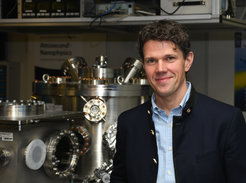Matthias Kling is now a Fellow of the APS
Prof. Matthias Kling has been named a Fellow of the American Physical Society (APS)

Election to Fellowship of the APS is a distinguished honour for physicist Matthias Kling, who is now in the Laboratory for Attosecond Physics (LAP) at the MPQ. Each year, the American Physical Society elects a small number of its members as Fellows. Candidates must first be nominated by the various divisions of the APS. These nominations are reviewed by the organization’s Fellowship Committee, and the successful candidates are then elected by the APS Council. To become a Fellow, the nominee must have made “exceptional contributions to the physics enterprise”. According to the citation, Kling was elected Fellow on the basis of his “many contributions to the field of attosecond science, particularly in the exploration of controlled, optical-field-driven electron dynamics in atoms, molecules, and nano-particles.”
“This honor means a great deal to me, and gives me a further incentive raising our ongoing research to an even higher level. As someone with close ties with the research community on the American continent, and appreciating the important role of the APS, I regard this award as one of the most important I have ever received,” says Matthias Kling. “In particular, I want to express my gratitude to all the members of my team for their wholehearted commitment to top-tier research,” he adds.
Kling’s work focuses on one of the most fundamental processes in optical physics – the photoemission of electrons. Together with his research group, he studies the dynamics of the light-driven emission of electrons from molecules and nanostructures, which provides insights into the electronic structure of these materials and the highly complex nature of the interactions between their electrons.
The APS was founded in 1899 and currently has well over 55,000 members worldwide. The Society comprises 17 Divisions and 13 Topical Groups, which covers all areas of physical research. Members of the APS can become Fellows of the Society on the basis of a precisely defined nomination and evaluation process, as outlined above.
Profile
Matthias Kling was born in Hannover in 1972. He studied Physics at the Georg-August-Universität in Göttingen, obtaining his diploma in 1998 and his PhD in femtosecond spectroscopy in 2002. In the years following his doctoral thesis, he held a Feodor Lynen Fellowship awarded by the Humboldt Foundation at the University of California in Berkeley (USA), and a Marie Curie Fellowship at the AMOLF Institute in Amsterdam (Netherlands). From 2007 to 2012, he led his own research group at the Max Planck Institute for Quantum Optics, which was funded by Emmy Noether and Heisenberg fellowships from the German Research Foundation (DFG). During this period, he laid the foundations for the development and application of attosecond spectroscopy to molecules and nanostructures. Following a short term as an Assistant Professor at Kansas State University (USA), he received an ERC Starting Grant from the EU in 2013, and returned to the LMU in Munich to take up a faculty position as Professor of Ultrafast Imaging and Nanophotonics. In 2019, he was appointed at MPQ as a Max Planck Fellow, and now collaborates closely with Prof. Ferenc Krausz (Director of LAP) on extending the application of attosecond physics to the characterization of molecules and nanostructures.












